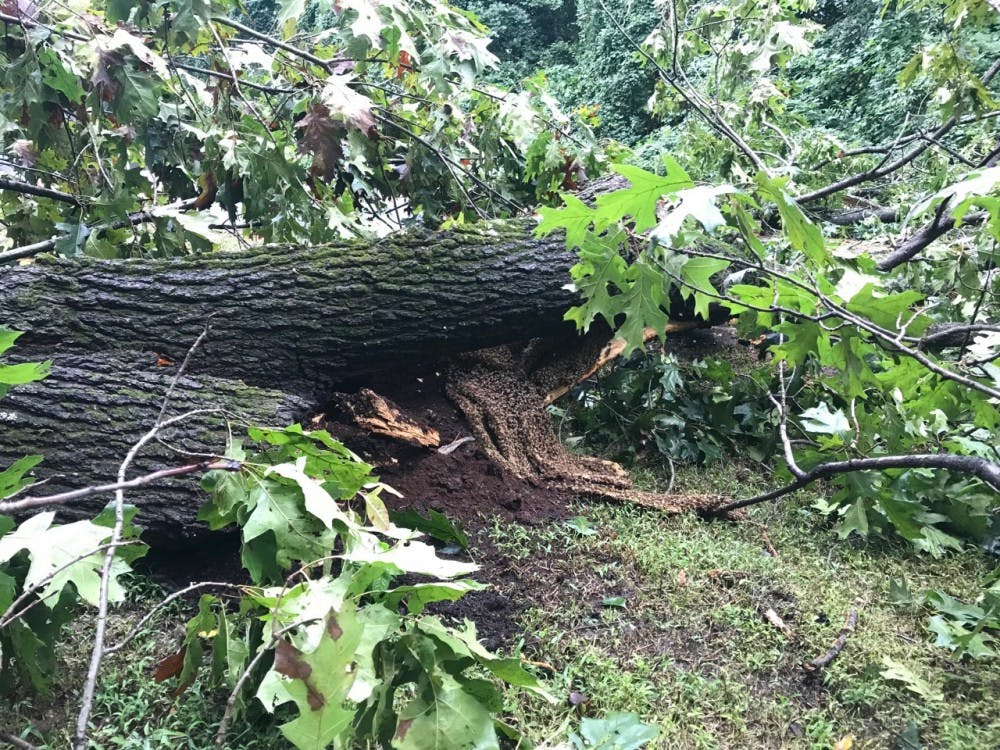BEES ARE DYING AT AN ALARMING RATE. This is a popular meme caption, but it is also a very real issue, especially in the United States, in Virginia and now on the University of Richmond’s campus.
In 2017, an alumni group gifted two beehives to the university. In their first winter, all of the bees in the two original hives died. The university replaced them both, and just one of those remains now.
UR’s beehives are located in a grassy area between the Wilton Center by Cannon Memorial Chapel and the steam plant, where Kirstin Berben, laboratories manager in the biology department and UR’s resident beekeeper, often takes biology classes to see and learn about the honeybees and their hives.
Berben, along with Joe Essid, director of the Writing Center, are UR’s two beekeepers. Essid has kept bees on his property in Goochland, Virginia, for 16 years, according to a UR press release published in June 2017. Essid was unavailable for comment.
Honeybees are responsible for pollinating 30 percent of the food that we buy at the grocery store, and Virginia, along with most of the United States, has been dealing with a drastic shortage of honeybees, Berben said.
Last winter, Virginia lost 60 percent of its bee population. This massive loss is partly attributed to an exceptionally dry summer that made foraging for food harder for honeybees, Berben said.
Because they weren’t able to forage during the summer, the bees had less food during an especially cold winter, and they died in large numbers.
This widespread loss of honeybees has to do with a phenomenon called colony collapse, Berben said. Colony collapse occurs when a number of stressing factors compound.
Stressors that contribute to colony collapse include poor foraging opportunities, presence of insecticides or pesticides and varroa mites, which are highly prevalent in Virginia, Berben said
“Say you kind of have the flu and your grocery store is five miles away,” Berben said. “You can only get there by walking, and then there’s this mite you have to carry on your back with you to get food. And then you finally get your food, and there are pesticides in it, which makes you a little sicker. It’s kind of just this whole spectrum of stresses.”
Although Virginia saw a loss of 60 percent of its bees last winter, UR saw an 100 percent loss. The two new hives that were purchased following this loss lasted only until about a month ago, when an entire hive’s population was found dead.
After tornadoes hit the Richmond area in September, a fallen tree was found on Towana Road near campus, according to a press release.
Enjoy what you're reading?
Signup for our newsletter
Inside the tree were about 70,000 honeybees that had been living in the rotted insides, according to the press release. Berben and Essid were able to save and transport the surviving honeybees to a new hive with Berben is keeping at her home for now, the press release said.
Upon finding these trapped bees, Berben checked the two hives on campus and found that the bees were alive and that the tornadoes had not effected them, she said.
Little did Berben know, the bees in one of the two remaining hive's days were numbered. “During an inspection the following week, they were all dead,” Berben said. “It had to be something that happened very quickly, but it’s hard to autopsy a hive.”
Berben said that when she found the dead bees, they had had their proboscis — or tongues — out, which indicates death by pesticides.
The university does not use pesticides on campus, so it may have been from ants that the bees had brought back to the hive or even from someone spraying bug repellent near the hive, Berben said.
“We are experiencing the same pressures and challenges being felt across the country in maintaining viable colonies," Joe Wolff, director of catering, wrote in an email.
Wolff is in charge of handling the honey that comes from the hives for use in UR’s catering services. Typically, a surplus of honey does not occur for at least two years, he said. But since the bees were not consuming it after they had died during the winter, he was able to collect a small amount.
“We ended up with just about enough honey that a small jar was given to each of the trustees that attended the April 2018 trustee meeting,” he said.
In the future, Berben hopes to add two more hives to the campus apiaries so that there will be three in all, she said. Wolff hopes for longer-lived colonies in order to begin using the honey for more dining projects, including a honey cake dessert in the dining hall, he said.
Contact senior features writer Lucy Nalen at lucy.nalen@richmond.edu.
Support independent student media
You can make a tax-deductible donation by clicking the button below, which takes you to our secure PayPal account. The page is set up to receive contributions in whatever amount you designate. We look forward to using the money we raise to further our mission of providing honest and accurate information to students, faculty, staff, alumni and others in the general public.
Donate Now



